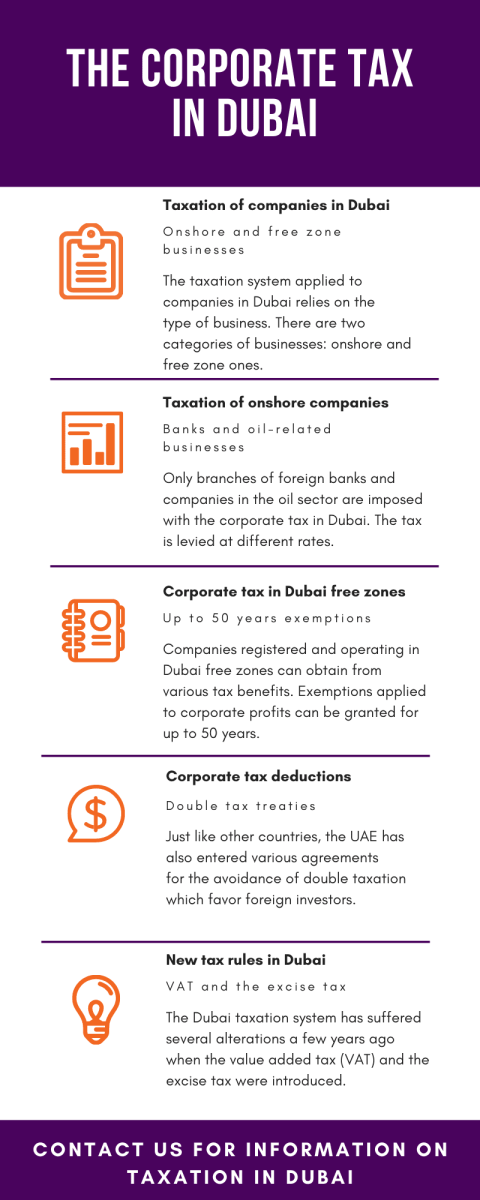Starting June 2023, Dubai will have a new corporate tax imposed at a rate of 9%. The taxation system will remain attractive for business persons interested in performing the activities in the free zones of Dubai where there is no corporate tax under specific conditions. In the oil and bank sectors in the Emirates, the corporate tax is set at a maximum rate of 55%. For a better understanding of the taxation system in Dubai, you may address your concerns to our lawyers in Dubai who can also help entrepreneurs set up their companies in compliance in the legislation in the UAE.
Taxes for companies in Dubai
Companies incorporated in Dubai are required to pay taxes on their earnings, but not all companies have to do so. At the beginning of 2023, a new tax legislation came into place providing for a 9% corporate tax for companies with profits exceeding AED 375,000 (around USD 100,000).
Oil companies in Dubai are subject to a maximum amount of 55% corporate income tax on the UAE-sourced income. As for branches of foreign banks in Dubai, these are obliged to pay a 20% tax rate on their Dubai source income. The calculation method for the taxable income is different for the two types of taxable businesses: the tax for banks is calculated according to their audited financial statements, while for oil companies the tax is due according to their concession agreements. Oil companies also have to pay other types of taxes in Dubai, like royalties. Please consider that the companies mentioned above are not subject to withholding taxes on remitted dividends and interests abroad. Our Dubai law firm can give you more information about the calculation methods.
You can read about how the corporate tax is applied in Dubai in the infographic below:
Other information about taxes in Dubai
Even if Dubai is nowadays a preferred business hub, the things have changed starting from January 2018. The financial authorities implemented the VAT rate of 5% for particular goods and services. The rate is low compared to other countries worldwide, but numerous companies already complied with the new legislation in this matter. Companies which activate in the jewelry, tobacco, luxury cars, and alcohol industry are subject to the VAT since January 2018. Besides that, an excise tax was already imposed on non-essential goods in the UAE.
We remind that branches in Dubai are treated just like any other company in Dubai and they are not subject to additional taxes. Once the new taxation system was accepted and implemented in 2018, companies aligned with the new requirements. Companies in Dubai are considered tax residents if all of their shares are owned by UAE residents and if all or a substantial part of the company’s income comes from a trade or business in Dubai.
Details about the excise tax in Dubai
Starting with October 2016, the financial authorities in the UAE have implemented an excise tax of 50% rate on tobacco products and carbonated drinks. These are considered unhealthy products which are already levied with the 5% VAT in 2018. One should know that the excise tax was implemented in the countries part of GCC (Gulf Cooperation Council).
Taking advantage of the double tax treaties signed by UAE
More than 92 double taxation agreements have been signed by UAE with countries worldwide, with the purpose of avoiding paying the taxes twice on incomes. In this direction, there are varied tax incentives like no taxes imposed on repatriated dividends, royalties and dividends. Companies with establishments in Dubai can benefit from reduced tax rates for capital gains and no taxes for shipping and air transportation. Let us mention you that double taxation treaties signed by UAE are available in mainland Dubai and the free trade zones. As for the legal aspects of DTTs signed by UAE, feel free to get in touch with our team of advisors. We can also help you apply for investor visas.
At first, the Dubai investment visa was created for investors interested in doing business in the UAE. Later on, the program expanded to other categories of immigrants, among which scientists, engineers, and other people who can add value to the country’s economy. This is one of the main reasons for considering this country for relocation.
What is the VAT in Dubai?
Since January 2018, the value added tax (VAT) has been imposed for the purchase of specific goods and services in Dubai. This is set at 5% rate and was introduced as a recommendation of the International Monetary Fund (IMF) and the local financial authorities in the UAE. Healthcare and education, plus the basic foodstuff are subject to the VAT in Dubai. The non-essential goods are levied with an excise tax ranging from 50% to 100%. For example, the energy drinks, luxury cars, and the tobacco products are levied with 100% representing the excise tax.
What you need to know about the dividend tax in Dubai
There are many reasons why foreign investors are looking to open companies in the UAE, and the tax structure is the most important one. Even though the VAT has been introduced since January 2018, foreigners do not see this as a major impediment when it comes to business formation because there are other benefits. For example, there is no tax on dividends for foreign or local investments, meaning that there is no withholding tax imposed. As for the branches established in Dubai, these can benefit from the double taxation treaties signed by UAE and the advantages in matters of dividend taxes for foreign companies where incentives are offered. Do not hesitate to solicit the legal support from our team of attorneys in Dubai.
Taxation in Dubai’s free trade zones
Having complete ownership and control in the business is the main purpose of an investor in a foreign country. Luckily, there are many countries that adopted a special business environment like the free trade zones. The same is available for UAE and Dubai where entrepreneurs from abroad can establish their companies without difficulties in the free zones. Dubai welcomes foreign investors to benefit from an appreciated business climate with excellent conditions among which the most important ones related to the taxes and ownership. There are more than 30 free trade zones established in Dubai, each of them controlled by the local authorities.
Companies opened in Dubai’s free trade zones have lots of benefits, and among these, no taxes imposed. There are also investment incentives provided to foreigners opening businesses in these free zones, but the important thing is the complete ownership which is allowed in these jurisdictions. Dubai International Financial Center, Jebel Ali Free Zone, Dubai Healthcare City, Dubai Internet City, Dubai Multi Commodities Center, Dubai Cars and Automobile Zone, Dubai Gold and Diamond Park, Dubai Studio City, International Media Production Zone, and Dubai Biotechnology and Research Park are quite representative and significant free trade zones with zero taxes on incomes, therefore no corporate tax imposed under specific conditions. In the same category of special zones with benefits, the companies established here can develop more than just one activity, can perform the operations in complete business confidentiality, and can have bank accounts in Dubai.
Also, foreigners who opened companies in Dubai’s free trade zones are allowed to purchase properties, especially in the production zones. There is no customs duty imposed, however, if companies deal with trading activities in mainland Dubai, these should pay attention to such taxes. Establishing a business in Dubai’s free trade zones involves less bureaucracy and formalities, nevertheless, it is recommended to consider the legal support in the case you are a foreign investor and need to understand the business requirements in this area.
We remind that companies operating in the banking sector or in the oil and gas field in Dubai are subject to the corporate tax imposed. These are the only businesses for which such kind of tax is imposed. As for other types of activities in Dubai, a series of tax exemptions apply. Having a complete idea about the tax structure in the UAE will help the foreign investor properly understand the business climate and conditions.
What are the taxes for individuals in Dubai?
Dubai can be regarded as a tax haven for companies and for individuals as there are no income taxes for individuals in Dubai. Also, individuals living and working in Dubai have no compliance obligations. Foreign citizens living and working in Dubai may be subject to taxation in their home countries for the income earned in Dubai, if the income is generated by the rental of a property or if they spend only a part of the fiscal year in Dubai and the rest in their home countries. However, due to the UAE’s double taxation agreements, the taxation of income can be avoided.
Indirect taxes in Dubai
The Dubai Government applies the following indirect taxes which need to be considered when relocating in the Emirates:
- a municipal tax of 10% which is levied on hotels and entertainment activities;
- a 50% tax on the import of alcoholic beverages;
- a 30% tax on the purchase of alcohol.
Our attorneys in Dubai can give you more information about the regulations for foreign companies and the special free trade zones where foreign investments are facilitated. You can contact our law firm in Dubai for comprehensive information and legal assistance.

